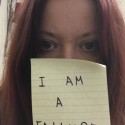Have you ever felt like a failure? Have you ever felt like a bad parent, child, partner, friend, student, mentor, human being? Have you felt like you simply weren’t good enough at something extremely important to you? And no matter what you did, you kept seeing the mistakes you made, seeing how others seemed to do it better, fearing that if others knew the truth about you, that they would no longer love you or want to be near you? Or perhaps you felt that you were not thin, beautiful, smart, courageous, creative, strong, productive, or supportive enough?
If the answer to any of these questions is “yes,” please keep reading.
How old are these beliefs? I imagine that some of them are nearly as old as you are. We carry these harsh beliefs with us like a priceless treasure, hidden deep within our tortured hearts. And ironically, the more we hide them, the more alone we might feel, yet the more we share them, the more we might come to understand that we are not at all alone in this. In fact, shame, the fear of failure, and the fear of loss of love based on a real or imagined contingency is the oldest, most universal fear that humans have.
I have a confession to make: I am a failure.
I am inadequate, afraid, not a good enough partner and parent, not a good enough friend or teacher, not experienced enough, not knowledgeable enough, amateur, not compassionate enough, not successful enough, and overall not enough.
These are just some of the self-critical thoughts that run through my head each and every day. They hurt. A lot. At times they overwhelm me. At times they stop me from doing what’s most important to me, essentially becoming a self-fulfilling prophecy.
At other times these thoughts motivate me. In fact, these thoughts can serve an important function, they keep us checking in with our core values – with what’s truly important to us. Perhaps someone who believes that they are a “loser” really values success and determination and someone who believes that they are a “bad parent” may deeply care about their children.
As motivating as a kick in the rear by our internal self-critic may be, this self-critical voice isn’t sustainable as a source of motivation. The reason for this is that when we have a setback what we really need is encouragement and hope. Whether it is a mistake that we made, or whether it is a daily struggle to get out of bed due to an overwhelming anxiety or depression, what we ultimately need is self -compassion.
Self-compassion essentially refers to treating ourselves with kindness and encouragement when we are struggling. It is not an easy practice, in fact, self-compassion is one of the most advanced self-improvement skills we can work on as human beings. During those difficult and excruciating times when the self-critic is having a “field day” at our expense, we can remind ourselves that it’s normal to struggle this way. Remember that you are not alone in this. This would be hard for anyone in your situation. Take a moment, take a breath to remind yourself of your purpose, of what’s truly important to you. Ask yourself, “what do I really need right now?” The answer may surprise you. It may be that you need a hug, or that you need to rest, sleep, or cry, or take a break for a few moments. DO EXACTLY THAT. Give yourself the permission to be kind to yourself. To recharge. To support yourself in order to have the strength and the resilience to reconnect with the mission of what is truly important to you.
The way we talk to ourselves and the way we talk to others matters. If we are mean, harsh-toned, and seemingly angry with ourselves, we may respond that same way to others. In fact, research suggests that anything we do not accept in ourselves we may not be able to accept in others. What is helpful in those difficult moments when we are struggling is a gentle touch (either a hug from someone else, or hugging ourselves by placing our hands on our heart) and soft gentle tone. These approaches – gentle touch and a soft gentle tone have been found through research to help soothe the person’s individual struggle as well as the suffering of others.
Many of us truly want to be and do good but may feel like a “failure” because we are held back by our own harsh beliefs about ourselves. What if we were softer and kinder to ourselves? Would our motivation change? Would we be able to reconnect with our core values or would we give up?
I would love to hear your thoughts.
May you know how truly wonderful you are. May you know your full potential. May you know how loved you are and all the difference you make in this world.
Dr. Janina Scarlet is a Licensed Clinical Psychologist, a scientist, and a full time geek. She uses Superhero Therapy to help patients with anxiety, depression, chronic pain, and PTSD at the Center for Stress and Anxiety Management and Sharp Memorial Hospital. Dr. Scarlet also teaches at Alliant International University, San Diego. Her book, Superhero Therapy, is expected to be released in 2016 with Little, Brown Book Group.
If you would like to learn more about Superhero Therapy, please feel free to contact Dr. Janina Scarlet via Twitter @shadowquill, Facebook: https://www.facebook.com/Shadow.Scarletl, or via her website at www.superhero-therapy.com
